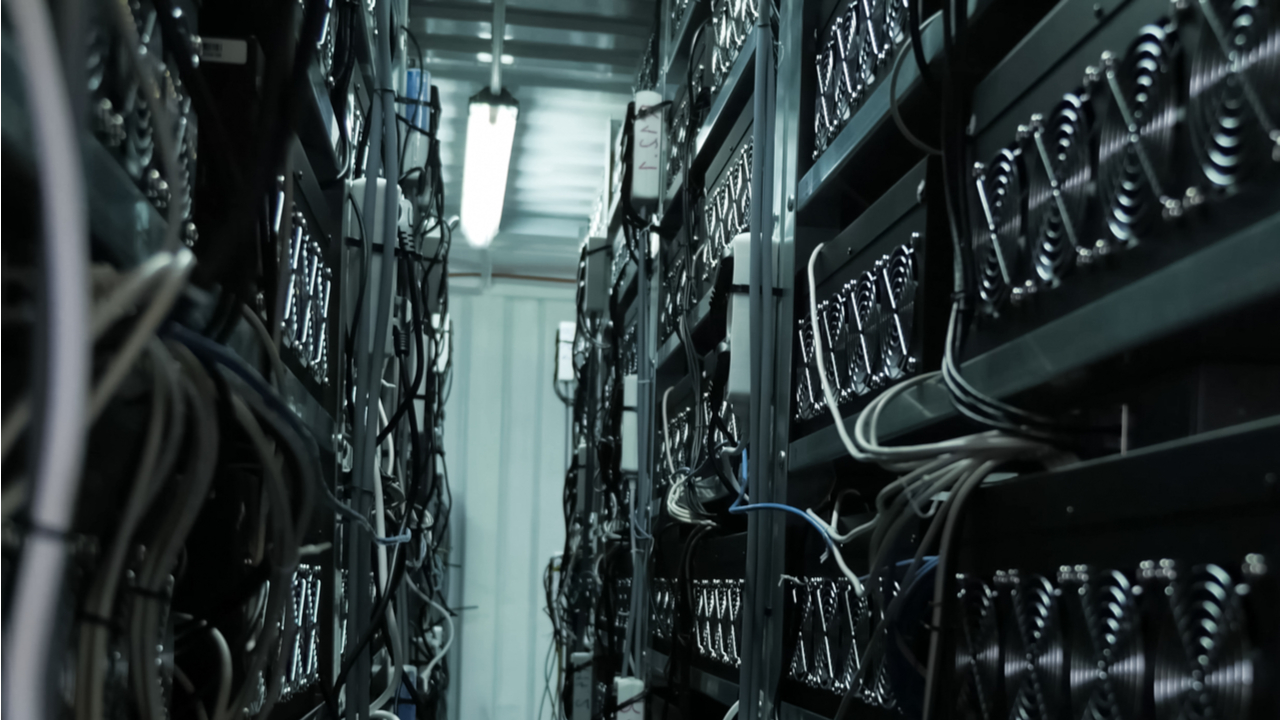 Authorities in Kyrgyzstan have uncovered and shut down a large crypto mining farm in the north of the country. Law enforcement officials claim the illegal coin minting facility has inflicted “colossal damage” to the nation’s power grid and that they are still trying to estimate the losses. Underground Crypto Farm Busted in Kyrgyzstan The region […]
Authorities in Kyrgyzstan have uncovered and shut down a large crypto mining farm in the north of the country. Law enforcement officials claim the illegal coin minting facility has inflicted “colossal damage” to the nation’s power grid and that they are still trying to estimate the losses. Underground Crypto Farm Busted in Kyrgyzstan The region […] Lawmakers from the Liberal Democratic Party of Russia are gearing up to introduce a draft law designed to regulate crypto mining. The nationalists say the legislation will benefit both Russian citizens and the state, as well as those who want to get involved in the business legally. Nationalists Propose Regulations for Russian Crypto Miners The […]
Lawmakers from the Liberal Democratic Party of Russia are gearing up to introduce a draft law designed to regulate crypto mining. The nationalists say the legislation will benefit both Russian citizens and the state, as well as those who want to get involved in the business legally. Nationalists Propose Regulations for Russian Crypto Miners The […] The law “On Virtual Assets,” Ukraine’s attempt to regulate its growing crypto space, has been revised again and recommended for final adoption. A key parliamentary committee has given its support for the bill which was vetoed by the Ukrainian president this month. Ukrainian Deputies to Vote on Updated ‘Virtual Assets’ Law in November The saga […]
The law “On Virtual Assets,” Ukraine’s attempt to regulate its growing crypto space, has been revised again and recommended for final adoption. A key parliamentary committee has given its support for the bill which was vetoed by the Ukrainian president this month. Ukrainian Deputies to Vote on Updated ‘Virtual Assets’ Law in November The saga […]
The new bill, if passed, will allow cyber warfare operatives to take over control of critical infrastructure under attack.
Australia’s top cyber spies are set to gain greater powers in the event of ransomware or other cyber attacks on critical infrastructure.
The Australian Signals Directorate (ASD), a government agency in charge of cyber warfare and information security, would be able to take over control of critical infrastructure — including energy, communications and banking systems — under new legislation introduced into Parliament.
The legislation even considers health care and grocery businesses to fall under the definition of critical infrastructure and imposes new positive security obligations.
For ASD operatives to provide assistance, operators from the affected infrastructure have to report a serious cyber incident.
According to The Australian newspaper, the Critical Infrastructure Bill will be introduced to parliament, on Oct. 20, with bipartisan support from the committee that examined it.
Home Affairs Minister Karen Andrews stated the measures proposed will ensure the safety of essential services that Australians rely on:
“Recent cyber-attacks and security threats to critical infrastructure, both in Australia and overseas, make these reforms critically important.”
But a coalition of Australian and international tech industry groups is opposed to the new laws. “Without significant revision, the bill will create an unworkable set of obligations and set a troubling global precedent,” they wrote in a joint letter.
There have been a string of high profile ransomware attacks this year, including the Colonial Pipeline cyber attack in the U.S. in May, which forced governments around the world to rethink their vulnerabilities and highlighted crypto’s role in the attacks.
Another ransomware attack in May, on Australian meat processor JBS, pushed Australian lawmakers to take a tougher stance. A new Ransomware Action Plan was released last week will allow Australian authorities to seize or freeze financial transactions in cryptocurrencies that are associated with cyber-crime regardless of the country of origin.
The Parliamentary Joint Committee on Intelligence and Security said the “threat of cyber security vulnerability and malicious cyber activity has become increasingly evident in recent years” with about a quarter of reported cyber security incidents affecting critical infrastructure organizations.
Related: Chainalysis acquires cybercrime investigative firm Excygent in fight against ransomware attacks
 Authorities in Estonia are working on new legislation expected to stiffen the rules for the country’s cryptocurrency sector. The Baltic nation’s regulator for the industry is considering whether to revoke previously issued crypto licenses and restart authorization from scratch. Licensed Crypto Companies Register Millions in Turnover, Estonia Gets Little With only around 1.3 million people, […]
Authorities in Estonia are working on new legislation expected to stiffen the rules for the country’s cryptocurrency sector. The Baltic nation’s regulator for the industry is considering whether to revoke previously issued crypto licenses and restart authorization from scratch. Licensed Crypto Companies Register Millions in Turnover, Estonia Gets Little With only around 1.3 million people, […] The Ukrainian president has sent the recently adopted law “On Virtual Assets” back to the Verkhovna Rada, the country’s legislature. The head of state has come up with his own suggestions and opposed the establishment of a new regulatory body that would require additional financing. Setting Up New Crypto Market Regulator Will Be Expensive, Zelensky […]
The Ukrainian president has sent the recently adopted law “On Virtual Assets” back to the Verkhovna Rada, the country’s legislature. The head of state has come up with his own suggestions and opposed the establishment of a new regulatory body that would require additional financing. Setting Up New Crypto Market Regulator Will Be Expensive, Zelensky […] The regulatory status of cryptocurrency mining remains somewhat undetermined in Ukraine, even after the recent adoption of the law “On Virtual Assets.” However, albeit unregulated, the minting of digital coins isn’t prohibited either, according to a leading advisor on crypto matters at the Ukrainian parliament. Amendments to Ukraine’s Tax Law to Regulate Accounting for Crypto […]
The regulatory status of cryptocurrency mining remains somewhat undetermined in Ukraine, even after the recent adoption of the law “On Virtual Assets.” However, albeit unregulated, the minting of digital coins isn’t prohibited either, according to a leading advisor on crypto matters at the Ukrainian parliament. Amendments to Ukraine’s Tax Law to Regulate Accounting for Crypto […] The parliament in Kyiv has passed legislation determining the rules for crypto-related operations in Ukraine. The law “On Virtual Assets” recognizes cryptocurrencies as intangible goods while denying them the status of legal tender. It also regulates the activities and obligations of crypto businesses. Ukraine Legalizes Crypto Activities, Defines Virtual Assets Ukraine’s Verkhovna Rada, the country’s […]
The parliament in Kyiv has passed legislation determining the rules for crypto-related operations in Ukraine. The law “On Virtual Assets” recognizes cryptocurrencies as intangible goods while denying them the status of legal tender. It also regulates the activities and obligations of crypto businesses. Ukraine Legalizes Crypto Activities, Defines Virtual Assets Ukraine’s Verkhovna Rada, the country’s […]
Bitcoin proponent Mark Cuban is certainly not happy with the tighter rules for crypto businesses introduced in the new infrastructure bill.
Leaders in the crypto industry continue to speak up as the bipartisan $1 trillion infrastructure bill, known for implementing tighter rules on crypto businesses and expanding reporting requirements for brokers, passed the United States Senate. Billionaire investor and Bitcoin (BTC) proponent Mark Cuban is one of them.
Speaking to The Washington Post over the weekend, before the bill officially passed the senate, Cuban drew a parallel between the growth of crypto to the rise of e-commerce and the internet in general:
“Shutting off this growth engine would be the equivalent of stopping e-commerce in 1995 because people were afraid of credit card fraud. Or regulating the creation of websites because some people initially thought they were complicated and didn’t understand what they would ever amount to.”
Mark Cuban is a vocal advocate for crypto and decentralized finance. The Dallas Mavericks owner is known for enabling the Mavs to accept Bitcoin, Ether (ETH) and Dogecoin (DOGE) payments for tickets and merchandise items.
He also argued in May that crypto asset prices are increasingly reflective of real utility and demand and that the day will eventually come when crypto is “mature to the point we wondered how we ever lived without.”
Related: Senators introduce pro-crypto amendment to infrastructure bill; industry says it's not enough
On Tuesday morning, the U.S. Senate passed the controversial bill in a 69–30 vote. The bill's main focus is roughly $1 trillion in funding for roads, bridges and major infrastructure projects.
However, the bill caused serious concerns among the crypto ecosystem as it would implement tighter rules on crypto businesses, expand reporting requirements for brokers and mandate that digital asset transactions worth more than $10,000 are reported to the Internal Revenue Service (IRS).
Senator Pat Toomey, who was among the lawmakers that have written an amendment to the infrastructure bill to exclude certain crypto companies from the reporting requirements for brokers, said the new legislation imposes “a badly flawed, and in some cases unworkable, cryptocurrency tax reporting mandate that threatens future technological innovation.”
 Residents of Ukraine will be able to legally keep, exchange, and spend cryptocurrencies once the new virtual assets law is adopted. The legislation will comprehensively regulate the crypto space, possibly lower taxes for Ukrainians and create conditions for new services, a government official revealed. New Regulations to Create Market for Crypto Services for Ukrainians Ukrainians […]
Residents of Ukraine will be able to legally keep, exchange, and spend cryptocurrencies once the new virtual assets law is adopted. The legislation will comprehensively regulate the crypto space, possibly lower taxes for Ukrainians and create conditions for new services, a government official revealed. New Regulations to Create Market for Crypto Services for Ukrainians Ukrainians […]